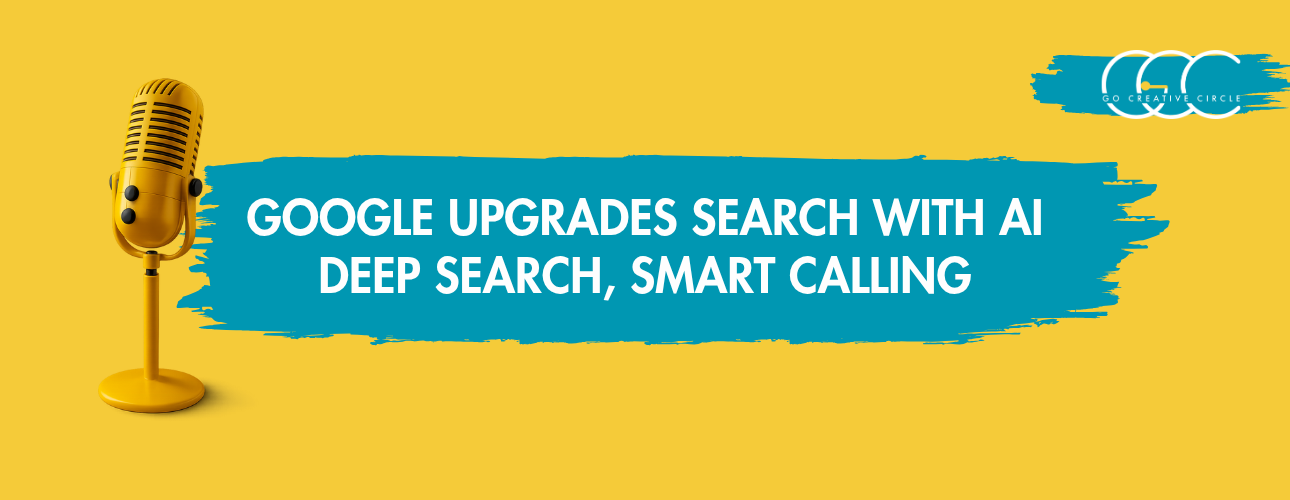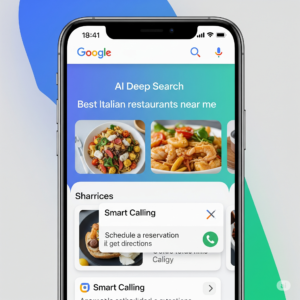
AI Deep Search revolutionizes how we conduct in-depth research, potentially saving us hours of work by running hundreds of searches simultaneously. Google is rolling out two significant enhancements to its AI Mode in Labs: Gemini 2.5 Pro and Deep Search. This powerful combination reflects Google’s broader effort to integrate generative AI into our everyday search experience.
Additionally, the Gemini AI Google has developed is especially useful for comprehensive research related to our jobs, hobbies, or studies. Alongside these research capabilities, Gemini AI is also expanding with an AI-powered local business calling feature in the United States. We can now search for services like “pet groomers near me” and have Google AI Deep Search check pricing and availability information in minutes. These innovations demonstrate how Google continues to transform the way we find and process information online.
Google launches Gemini 2.5 Pro in AI Mode
Google has unveiled Gemini 2.5 Pro, its most intelligent AI model to date, marking a significant advancement in the company’s AI capabilities. This latest model, created by Google DeepMind, represents the first in the Gemini series to be purpose-built as a “thinking model” with advanced reasoning functionality at its core.
The new model excels in complex reasoning tasks, outperforming competitors like OpenAI and Anthropic on various benchmarks, including Humanity’s Last Exam, where it achieved a state-of-the-art 18.8% across models without tool use. Furthermore, Gemini 2.5 Pro ranks first on the WebDev Arena leaderboard, showcasing its superior ability to build aesthetically pleasing and functional web applications.
A standout feature of Gemini 2.5 Pro is its massive context window of 1 million tokens, with plans to expand to 2 million tokens soon. This extensive capacity allows the model to process entire codebases (approximately 30,000 lines), long technical documents, hours of video, or large datasets without requiring complex workarounds.
Moreover, Gemini 2.5 Pro is truly multimodal, inherently understanding and processing text, code, images, audio, and video inputs simultaneously. This comprehensive capability enables users to debug code using error message screenshots, analyze UI mockups alongside requirement documents, or even generate code from diagrams.
For Google AI Pro and AI Ultra subscribers, Gemini 2.5 Pro is now available in AI Mode through a drop-down menu. When combined with Google Search grounding, the model can connect to real-time web content across all available languages, reducing hallucinations by basing responses on factual information.
Consequently, developers can now build applications that increase factual accuracy, access real-time information, and provide citations to build user trust. The model handles the entire workflow of searching, processing, and citing information automatically, making it an invaluable tool for complex research tasks.
Google introduces Deep Search for advanced research
Building upon its AI innovations, Google has introduced Deep Search as part of its AI Mode, powered by the Gemini 2.5 Pro model. This advanced research tool stands apart from traditional search by autonomously issuing hundreds of searches, reasoning across disparate information sources, and compiling comprehensive, fully-cited reports in minutes.
Deep Search primarily targets complex queries that require broader or deeper information gathering. Rather than simply answering questions, it analyzes multiple sources and synthesizes findings into detailed research reports. This capability is particularly valuable for users researching nuanced topics like neighborhood amenities when relocating, education options, or creating travel itineraries with specific preferences.
The technology works by transforming your prompt into a personalized multi-point research plan. It then autonomously searches and browses the web to gather relevant, up-to-date information. Throughout this process, Deep Search displays its thinking as it reasons over collected data and plans next steps.
Users benefit from several practical applications:
- Financial analysis and planning
- Academic and specialized research
- Comparing products based on features, performance, and reviews
- Competitive analysis for business purposes
- Making significant life decisions like purchasing a home
Unlike conventional search tools, Deep Search critically evaluates information, identifies key themes and inconsistencies, and structures reports logically. It even performs multiple passes of self-critique to enhance clarity and detail.
Currently, Deep Search is available to Google AI Pro and AI Ultra subscribers in the US who have enabled AI Mode through Labs. Users simply visit google.com/aimode on desktop, click Deep Search in the “Ask anything” bar, and enter their query. The system typically generates reports in about five minutes, though more complex requests may take longer.
This tool represents a step toward more agentic AI that moves beyond simple question-answering to become a collaborative partner capable of sophisticated thinking and execution.
Google adds Smart Calling to contact local businesses

In another significant expansion of its AI capabilities, Google has launched a Smart Calling feature that allows the search engine to place calls to local businesses on behalf of users. This innovative service is now available to all Search users across the United States, eliminating the need for direct phone communication while gathering essential information.
The new feature appears as a “Have AI check pricing” button when searching for specific local services. Upon clicking this option, users answer a few quick questions about their needs, and subsequently, Google’s AI—powered by Gemini and Duplex models—places calls to businesses to collect pricing and availability details.
For transparency, the AI assistant always identifies itself as “a Google AI assistant calling on your behalf” when contacting businesses. After collecting the requested information, it delivers a comprehensive summary directly to the user via their preferred method—text or email. This advancement specifically benefits those who prefer avoiding phone calls, including younger generations who often experience phone anxiety.
Currently, the service works with several types of local businesses:
- Pet groomers
- Dry cleaners
- Auto repair shops
- Restaurants (for wait time information)
Notably, business owners retain control over this interaction—they can opt out of receiving AI calls through their Google Business profile settings. For those businesses that participate, however, this creates new opportunities to easily connect with potential customers.
While widely available throughout most of the US, the service is not accessible in five states: Indiana, Louisiana, Minnesota, Montana, and Nebraska. Google AI Pro and Ultra subscribers receive higher usage limits compared to standard users.
All calls are recorded for quality assurance purposes, and Google has implemented reasonable calling hours to avoid disrupting businesses during early morning or late night hours. Indeed, this feature represents a significant step toward more autonomous AI services that can independently complete practical tasks that previously required human interaction.
Conclusion
As we look at Google’s latest AI offerings, the combined power of Gemini 2.5 Pro and Deep Search marks a significant shift in how we interact with information online. Previously, thorough research required hours of manual searching and synthesizing information from multiple sources. Now, AI Deep Search handles this process automatically, running hundreds of searches simultaneously while we focus on other tasks.
Additionally, Gemini 2.5 Pro stands out with its massive one-million token context window and multimodal capabilities, allowing us to process entire codebases or long technical documents without complicated workarounds. This advancement essentially transforms Google Search from a simple query tool into an intelligent research assistant.
The Smart Calling feature likewise changes how we gather information from local businesses. Rather than spending time making multiple calls to compare services, we can let Google’s AI assistant handle these interactions. Consequently, this saves us considerable time while still getting personalized information about pricing and availability.
Therefore, when we consider these developments together, Google has fundamentally altered our relationship with online information. The company has addressed both complex research needs and practical everyday tasks through AI integration.
Undoubtedly, these tools represent just the beginning of more agentic AI systems that can think, reason, and act on our behalf. While currently limited to specific regions and subscription tiers, these features will likely expand to more users over time. Google’s direction suggests a future where AI assistants become increasingly capable collaborators in our daily lives, handling information-gathering tasks that once required significant human effort.
Contact us to get Best Digital Marketing Services in UAE.



